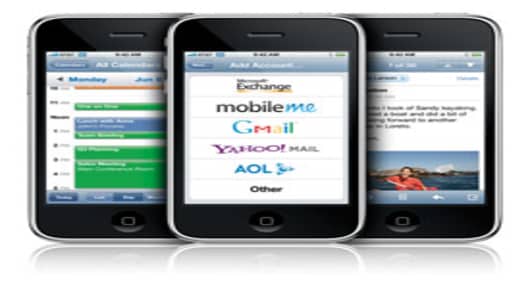AT&T will suffer lower earnings this year and next year as it plans to subsidize the price of the latest iPhone from Apple in a bet it can help it boost data services and steal customers.
While some analysts applauded the plan, saying it would broaden the market for the high-speed version of the most talked about cell phone in history, others questioned whether AT&Twas sacrificing too much for one product.
AT&T, the largest U.S. mobile phone service provider, said iPhone subsidies would cut its earnings per share by 10 cents to 12 cents in 2008 and 2009 and Chief Financial Officer Rick Lindner said the move would put pressure on AT&T's forecast for double-digit earnings growth this year.
AT&T, the exclusive U.S. service provider for the iPhone, said it was subsidizing the latest device to make it affordable. The new iPhone will cost $199, half the previous entry-level price.
Under the new pact, AT&T will not give Apple part of its monthly service fees, unlike their first iPhone agreement.
But investors focused on the hit to earnings and pushed AT&T's shares down 1.7 percent. Crowell, Weedon & Co analyst Douglas Christopher said AT&T's profit should not have to suffer for an agreement to sell a hot new phone.
"I think that in this type of market asking shareholders to deal with more dilution for the sake of iPhone is a lot," said Christopher, who has a buy rating on AT&T shares.
Gartner analyst Kenneth Dulaney said the plan to stop paying a portion of revenue to Apple made the hit to earnings all the more surprising.
"This says that the product is so hot the carriers have lost all their power to negotiate," he said.
iPhone Advantage
AT&T said the new iPhone initiative would start adding to earnings in 2010. It did not detail the subsidy arrangement nor how much in service fees Apple was forsaking under the pact.
Executives of AT&T, which competes against Verizon Wireless and Sprint Nextel, said iPhone would help it win customers who can afford to pay monthly fees for wireless data services, such as businesses giving employees e-mail on-the-go.
"We expect this will spur demand, boost adoption of data services, and attract high-value customers," AT&T CFO Lindner told analysts on a conference call.
Some analysts said the move should boost average revenue per subscriber and help AT&T win customers from its biggest rival, Verizon Wireless, which is aiming to overtake AT&T as No. 1 later this year by buying rural provider Alltel.
"The initial hit is not good but they don't have that ongoing license fee," said Joseph Bonner, an analyst at Argus Research. "Long term it might actually wash out. The point is to acquire the subscriber and keep them."
AT&T said the new phones would go on sale beginning July 11 to customers who sign up for a two-year contract.
There would be penalties for users who do not activate the iPhone in the first 30 days, AT&T said, in a move aimed at reducing the number of customers who buy an iPhone and tweak it so that they can use it on another network.
The $199 version of the new iPhone will have 8 gigabytes of storage and a $299 model will have 16 gigabytes compared with the existing iPhone, which runs on a slower data network but costs $399 or $499. AT&T said the subsidy would boost sales.
"If you loved the first iPhone you're going to be blown away by this version," Ralph de la Vega, the head of AT&T's wireless business, told analysts on the same call.
AT&T also said it was increasing its data service charge for subscribers with the new iPhone to $30 a month from $20 for the existing iPhone. Business customers will have to pay $45 a month for data services. This is on top of voice service plans, of which AT&T's cheapest is $39.99 a month, it said.
AT&T forecast a 2008 adjusted consolidated operating income margin of 24 percent and forecast a full-year wireless operating profit margin of 39 percent to 40 percent.
Verizon Wireless is owned by Verizon Communications and Vodafone Group. Shares of AT&T fell 65 cents to close at $37.56 on the New York Stock Exchange. Apple shares fell 2.2 percent to $181.61.


